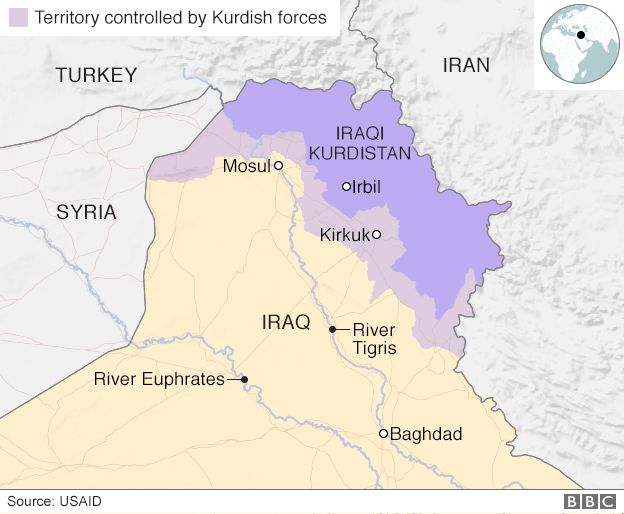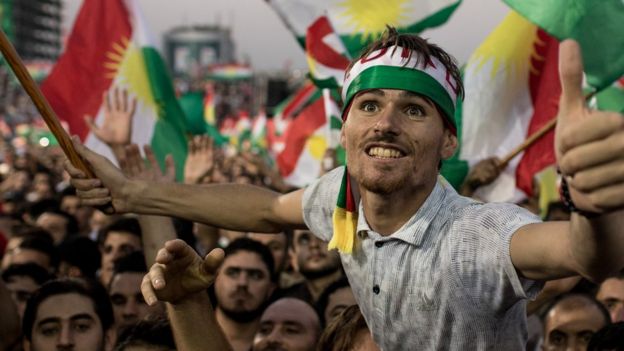Voters are heading to the polls in a controversial independence referendum in the Kurdistan Region of Iraq.
Iraq's prime minister has warned he will take "necessary measures to preserve the unity of the country".
Western countries have expressed concern that the poll could provoke fresh conflict, and distract from the fight against so-called Islamic State.
But Kurds, who have long fought for their own state, have pressed ahead. The result, however, is non-binding.
A Yes result is widely expected.
Iraq has said the referendum must be suspended, but it cannot enforce that decision on the autonomous region.
Ahead of the vote, Prime Minister Haider al-Abadi said the vote was unconstitutional and threatened peace, adding: "We will take the necessary measures to preserve the unity of the country."
He did not make clear which measures he intended to implement.
Later, his government demanded the Kurdish region hand over control of its international border posts.
It also urged other countries not to buy oil from the Kurdistan region, but instead to deal only with the government on "oil and borders". Oil is one of of the Kurdistan region's main exports.
The leader of Iraqi Kurds, Massoud Barzani, says that independence is the only way to guarantee the safety of his people.
"When have we ever had stability and security that we should be concerned about losing it?" he told the BBC in a recent interview. "Those who are saying this are just looking for excuses to stop us."
But he pledged that the referendum would not affect the fight against IS.
What is the Kurdistan Region of Iraq?

The autonomous region in the north is run by the Kurdistan Regional government, and it is formally recognised by Iraq's 2005 constitution.
That recognition came after decades of struggling for independence by the Kurdish population, who make up only 15-20% of the country's population.
In the wake of the first Gulf War, Kurdish leaders and armed forces consolidated their territory in northern Iraq, leading to the 2005 agreement.
It is the only place where the Kurdish people have formed their own government, despite many decades of armed struggle across four countries where its 30-40 million members live.
Iran and Turkey have also expressed concern that the independence referendum could provoke separatist movements among Kurds living in their own nations.
In Turkey, the Kurdistan Workers' Party is considered a terrorist organisation, and it has been engaged in a decades-long armed struggle for an independent state. A linked group, PJAK, exists in Iran.
 |
| In Irbil, supporters rallied in large numbers on Friday |
But Kurdish fighters known as Peshmerga have been one of the most successful fighting forces against IS in Syria and Iraq.
They are considered a US military ally, although Washington does not support the referendum - favouring a series of negotiations on the future relationship between Iraqi Kurds and Baghdad.
Israel is the only nation to have openly supported the independence bid.
The Kurdish people are a distinct ethnic group spread across Iraq, Syria, Turkey, and Iran.
Polls in the independence referendum will remain open for 12 hours, until 20:00 (17:00 GMT).
Analysis: Turkey's talk all for show?
Mark Lowen, BBC News, Ankara
Turkey has called the referendum a "terrible mistake" and warned it could foment civil war.
Turkish tanks have been sent to the border with northern Iraq, and the parliament in Ankara has extended the mandate of Turkish troops to intervene in Iraq and Syria.
But the public condemnation is likely aimed more to please the government's nationalist support base -Kurdish insurgency in Turkey has killed 40,000 people since the 1980s.
Privately, Ankara is probably less hostile:
- It has built up a strong relationship with the Kurdistan Regional Government, which exports hundreds of thousands of barrels of oil per day through Turkey
- Around 1,300 Turkish companies work in Iraqi Kurdistan, having built Irbil airport
- It relies on the Kurdish government's opposition to the PKK militant group, which operates from northern Iraq
While Ankara has threatened sanctions over the referendum, oil exports have not stopped and Turkish Airlines continues flights.
It all suggests Turkey's rhetoric is partly for show and behind closed doors it simply wants stability and continuing bilateral relations, whatever the outcome of the referendum.
Source: BBCNews


No comments:
Post a Comment
Add a Comment...